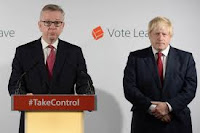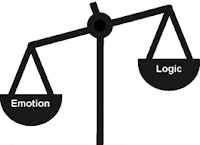Brexit - The £350m figure and the Need for Balance
My gast was truly flabbered to hear the £350 million per day figure from the side of the red bus repeated AS IF FACT on a BBC newsbeat programme, on Radio 1 at lunchtime. Even more so to hear it repeated at 5.45pm.
This is despite the BBC itself declaring this is a gross figure, and the realistic figure is far smaller.
A year ago the BBC published this assessment, pointing out that
"The figure of £156m is what you get if you take the gross contribution and subtract the rebate and the amount spent by the EU on funding things in the UK such as supporting farmers and regional aid."
But this doesn't take into account the cost of replicating agencies and work currently paid out of the UK's contributions to the EU. For example it has been recently been announced that the UK would have to build its own equivalent to Galileo. As reported by the BBC again "Costs for a UK-only sat-nav system are likely to run to several billion pounds."
Indeed some estimates suggest that there would be a net cost to leaving the EU. No saving at all. And that's before any negative economic impact, which risks dwarfing the figures above..
THE NEED FOR BALANCE
So why has the BBC news team allowed the £350m figure to slip out during their broadcasts?
Apart from the need for heads to roll, these sort of things happen due to the need for "balance".
For a few years now the BBC has to adhere to the same OFCOM rules and guidance as other broadcasters. "The OFCOM Broadcasting Code of April 2017 can be downloaded here."
That addresses 'balance'. Section 5 is titled "Due Impartiality and Due Accuracy and Undue Prominence of Views and Opinions"
The fundamental principle in 5.1 is "News, in whatever form, must be reported with due accuracy and presented with due impartiality." Bear in mind the above were news programmes, though the item repeated could be regarded as an opinion piece.
It goes on. 5,5, says "Due impartiality on matters of political or industrial controversy and matters relating to current public policy must be preserved on the part of any person providing a service (listed above). This may be achieved within a programme or over a series of programmes taken as a whole." In this case it was within a single programme.
5.7 starts with "Views and facts must not be misrepresented."
There are a lot of other details, but those few extracts set out the relevant principles.
If the debate was, say, on socialism, OFCOM would expect someone speaking for socialism and someone against it. OFCOM would also expect "facts not to be misrepresented".
So why should Brexit be any different? Obviously it shouldn't. The BBC and other broadcasters:
That is the broadcasters' challenge. To establish facts, as they have already done in today's broadcast examples, and defend against challenge by the excluded viewpoint. Of course it is easier to "give in" to avoid such challenge, but that is a dereliction of duty. And such an approach will itself give rise to challenge from the other perspective, as in this piece.
Broadcasters please take note, and choose the right path within the Code.
This is despite the BBC itself declaring this is a gross figure, and the realistic figure is far smaller.
A year ago the BBC published this assessment, pointing out that
- The gross figure is currently less than £350m per week
- This ignores the "rebate" and other monies that come back into the UK as grants etc
"The figure of £156m is what you get if you take the gross contribution and subtract the rebate and the amount spent by the EU on funding things in the UK such as supporting farmers and regional aid."
But this doesn't take into account the cost of replicating agencies and work currently paid out of the UK's contributions to the EU. For example it has been recently been announced that the UK would have to build its own equivalent to Galileo. As reported by the BBC again "Costs for a UK-only sat-nav system are likely to run to several billion pounds."
Indeed some estimates suggest that there would be a net cost to leaving the EU. No saving at all. And that's before any negative economic impact, which risks dwarfing the figures above..
THE NEED FOR BALANCE
So why has the BBC news team allowed the £350m figure to slip out during their broadcasts?
Apart from the need for heads to roll, these sort of things happen due to the need for "balance".
For a few years now the BBC has to adhere to the same OFCOM rules and guidance as other broadcasters. "The OFCOM Broadcasting Code of April 2017 can be downloaded here."
That addresses 'balance'. Section 5 is titled "Due Impartiality and Due Accuracy and Undue Prominence of Views and Opinions"
The fundamental principle in 5.1 is "News, in whatever form, must be reported with due accuracy and presented with due impartiality." Bear in mind the above were news programmes, though the item repeated could be regarded as an opinion piece.
It goes on. 5,5, says "Due impartiality on matters of political or industrial controversy and matters relating to current public policy must be preserved on the part of any person providing a service (listed above). This may be achieved within a programme or over a series of programmes taken as a whole." In this case it was within a single programme.
If the debate was, say, on socialism, OFCOM would expect someone speaking for socialism and someone against it. OFCOM would also expect "facts not to be misrepresented".
So why should Brexit be any different? Obviously it shouldn't. The BBC and other broadcasters:
- Should not allow facts to be misrepresented, i.e. if facts are known to be either incorrect or misleading
- By extention, should not allow views to be expressed that are based on such erroneous facts
- Members of the public should not be given a platform when their view are based on erroneous facts
- Likewise nor should equivalent politicians
That is the broadcasters' challenge. To establish facts, as they have already done in today's broadcast examples, and defend against challenge by the excluded viewpoint. Of course it is easier to "give in" to avoid such challenge, but that is a dereliction of duty. And such an approach will itself give rise to challenge from the other perspective, as in this piece.
Broadcasters please take note, and choose the right path within the Code.




Comments
Post a Comment